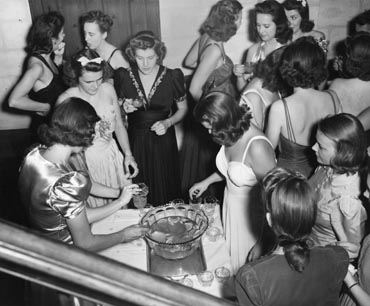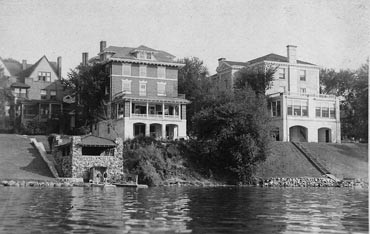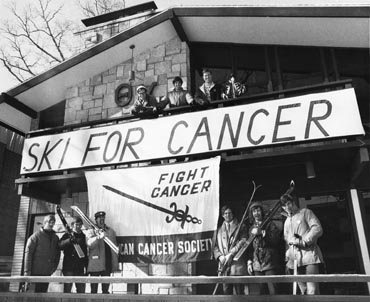Go Greek again! Greek life turns 150 years
The University of Wisconsin–Madison Greek community is celebrating its 150th anniversary this year. Greek organizations possess a long and storied history on the UW–Madison campus and have nurtured some major success stories, including seven of the top 10 donors to the university.

Langdon Street has been home to many Greek organizations since the late 19th century. This picture from 1956 was taken at the corner of Langdon and Henry streets. When the university residence hall system expanded after World War II, many students continued to live in fraternity and sorority houses because of the freedom they offered.

While university officials considered fraternities and sororities “secret societies” in the late 19th and early 20th centuries, Greek organizations soon began to take on a much more public image by holding formal balls and other parties, like the one pictured here circa 1950s.

Psi Upsilon, Alpha Tau Omega, and Alpha Delta Phi Greek houses (left to right) are seen from Lake Mendota in 1916. During the late 1800s, many fraternities built houses on land near the university, providing an important source of student housing during that era.

Community service has been a large part of Greek life in the 20th century. In this photo from the 1970s, the fraternity Theta Chi raises money with a skiing fund-raiser to support cancer research.
Photos courtesy University Archives.
The first fraternity, Phi Delta Theta, was established in 1857 and Greek life grew rapidly as enrollment in the university increased after the Civil War. Sororities originated on campus in 1875 with the establishment of Kappa Kappa Gamma. During the late 19th century, the fraternal organizations purchased land near campus that was not owned by the university to build chapter houses.
At the time, the chapter houses provided much-needed student housing in the absence of the current university residence hall system. However, the organizations have provided chapter members with much more than just a place to live.
According to Barbara Kautz, the student involvement coordinator, fraternities originated as literary societies in the 18th and early 19th centuries. The chapter members used their knowledge of the Greek language and Greek mythology to identify the fraternities.
"The students wanted to be able to have a forum to debate and discuss scholarly things," says Kautz.
Since then, she says, fraternities and sororities have evolved into values-based organizations. The core values of the fraternal organizations are service, scholarship, sisterhood/brotherhood and leadership.
Arthur Hove, a former assistant to the chancellor and provost and a campus historian, says he joined the Kappa Sigma fraternity after coming to campus in 1952 because it gave him more freedom to choose where he lived and with whom he socialized.
"You chose who you got to live with because when you rushed a fraternity or sorority, the members of the chapter would pick who the pledge class would be," he says. "So each house had a kind of identity to a certain degree because they were people who had like interests and backgrounds and personalities, whereas if you look at residence halls, they decide where you're going to live."
Hove, whose national fraternity boasts alums as diverse as Bob Dole, Jimmy Buffett and Robert Redford, says that other notable Greek alums from his UW–Madison class were U.S. Sen. Herb Kohl and Major League Baseball Commissioner Bud Selig, both members of Pi Lambda Phi.
Hove and Kautz both acknowledge the 1950s as the peak of Greek life on campus. This is partly due to the emergence of a more radical campus environment in the 1960s and 1970s that caused Greek life membership to dwindle.
"[Greek Life] was, in some people's minds, irrelevant in terms of the culture of the times," Hove says.
In the late 1970s and 1980s, however, fraternity and sorority membership increased. UW–Madison Assistant Dean of Students Mary Rouse commented in a 1978 statement: "Many students have turned to Greek life to find a small group of friends within a large campus population. These students felt lost, alienated, and disillusioned by the Vietnam War, by Watergate, and by the failings of the civil rights movements."
According to Greek life intern and UW–Madison student Meredith Bell, Greek life reached a post-Vietnam peak in 1986. Kautz said popularity in fraternities and sororities grew with the release of movies such as "Animal House" that depicted fraternity and sorority life in a wilder light.
According to Kautz, pledging of fraternities and sororities leveled off in the 1990s. In 2007, 10 percent of undergraduate students at UW–Madison belonged to a Greek organization. Currently, the Greek community is made up of 2,700 members and four governance councils. Students involved in fraternities and sororities are active members of the campus and the community. In the past year, members of the Greek community have taken on the issue of campus and surrounding area safety and spearheaded a Langdon Street Neighborhood Watch Program, being the first type of program of its kind on campus.
In addition to social activities, leadership workshops, and educational programming, fraternities and sororities on campus are involved in community service and philanthropic endeavors. Bell says she joined a sorority specifically for service reasons.
"I had done a lot of community service in high school, and I thought it was an easy way to get involved with that, and to meet people," she says.
Bell says the majority of Greek organizations participate in a large fund-raiser each semester, and most also have a specific charity for which they raise money. Bell's sorority, Gamma Phi Beta, raises money each year for the Cystic Fibrosis Foundation and the Lions Camp, a summer camp for children and adults with disabilities.
In 2005, campus Greek organizations raised over $50,000 for charities and donated over 10,000 hours of community service, she says.
While fraternities and sororities have had a reputation for being secretive over the course of their history, Kautz says Greek life has become more open in recent years.
"I think it's kind of a national trend to share more with the public," she says, "because if you've got something that stands for something really great, why not share it with people?"
The UW–Madison Greek community's 150th celebration events kicked-off on April 20 with an alumni reception prior to the Humorology Show on campus, Kautz says, and will continue through the rest of the year with a focus on drawing Greek alumni back to campus. A Greek open house from 2-4 p.m. on May 12 is planned for UW's Alumni Weekend and a Greek alumni reunion weekend for the Oct. 20 Wisconsin-Northern Illinois football game with a tailgate at the field house prior to the game.
The National Pan-Hellenic Council (historically African American chapters) is also tentatively planning a Step Show for the evening following the football game. Greek chapter houses will also be opening their doors to the public on Oct. 21 when the Panhellenic sororities and few IFC fraternities showcase their chapter homes in a Greek parade of homes from 1-3 p.m.
All faculty, staff, students and community members are invited to attend. The festivities will conclude with a Greek 150 Year Anniversary Alumni Float in the Homecoming Parade. Following the parade there will be the annual reception and fireworks show for alumni to enjoy.
Tags: events, student life
